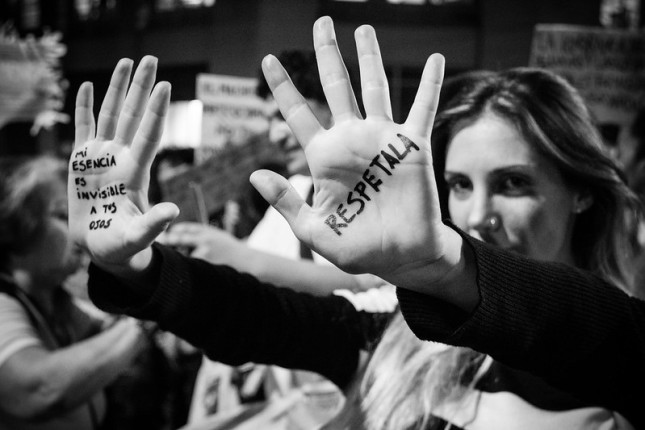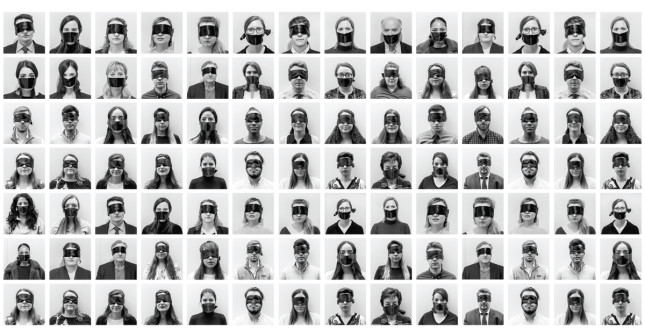-
Accessing Justice: Femicide and the Rule of Law in Latin America

“The pandemic is just making visible a reality that has been going on for decades,” said Claudia Calvin, Founder of Mujeres Construyendo (Women Building) and a member of Nosotras Tenemos Otros Datos (We Have Other Data). She spoke at a recent Wilson Center event on femicide and the rule of law in Latin America. The panelists discussed the longstanding roots of this issue and new barriers to protecting women and preventing violence during the pandemic in the launch event for a project examining gender-based violence in Latin America, co-hosted by the Brazil Institute, Latin America Program, Mexico Institute, and Maternal Health Initiative. “Violence against women and femicides are not new,” Calvin said. But what is new is the fact that the media and civil society are bringing this topic to our attention, she said.
Gender Bias Fuels Violence
Crimes involving gender-based violence are crimes with “a strong cultural root,” said Juliana Martins, Institutional Coordinator of the Brazilian Forum on Public Safety (FBSP). We’ve been socialized to think that men and women perform specific gender roles, she said, and it can be hard to depart from these predetermined roles.
Greater female representation in politics, the economy, and other sectors would strengthen the call to address gender-based violence, the panelists said. “You really need to have that equity and parity throughout the system,” said Georgiana Braga-Orillard, Resident Representative in El Salvador for the United Nations Development Programme (UNDP). You need to be able to see women in technology, women driving trucks, women everywhere. “You need to break those stereotypes and insert women throughout society,” she said.
Data underscore the extent of these biases. Ninety-one percent of men and 86 percent of women show some kind of bias against gender equality in El Salvador, said Braga-Orillard. These biases exist not only within the home, but in areas such as politics, economics, and education as well as in discussions of women’s physical integrity. These biases, she said, have increased over time, despite the large role that women in El Salvador play in the strong, informal economy.
As a result, these biases allow gender-based violence to be normalized in Latin America, which in turn desensitizes citizens, media, and government to this type of violence. Having a society that blames the victim instead of her perpetrator, said Calvin, is a significant obstacle to better policies and more resources for combating gender-based violence.
Training Police to Respond to GBV
These biases often influence police response to gender-based violence in Latin America, in the absence of targeted training programs. “Usually the aggressor in these kinds of violence—domestic violence or femicide—they don’t correspond to the stereotype of ‘enemy’ and ‘criminal’ that the police are trained to identify,” said Martins. When the perpetrator is a father, a husband, a good employee, or someone who does not appear violent to the outside world, it’s harder for police officers to spot the aggressor. They need to understand that this is a different type of violence and different type of criminal from the ones they are traditionally trained to identify.
More education is needed within the judicial system, said Calvin. “We need to train the police, the public ministers, and the whole judicial chain to understand the problem,” she said. To combat this issue in Brazil, the Brazilian Forum on Public Safety has developed several initiatives to promote innovation in the police and justice system, and to train officers to better handle cases involving gender-based violence.
Besides training police to understand the complicated nature of gender-based violence, better coordination among organizations is needed. The challenge for the Patrulha Maria da Penha police patrols is to be able to work within a broader net of protection, with more people involved, not only the police, but also the health system, and social services Martins said.

Underreporting and Data Transparency
The lack of accurate, comprehensive public data on gender-based violence is yet another challenge that complicates efforts to target resources and policy measures to combat gender-based violence. Women may be unwilling or afraid to report it, in part because reporting carries risks and violence often goes unpunished—despite legal protections—reducing the official number of registered cases. Fifty-two percent of Brazilian women did not report their aggressor according to an FBSP study, said Martins. Social isolation measures imposed to control the spread of COVID-19 have further prevented women from reporting perpetrators. In El Salvador, according to Braga-Orillard, 67 percent of women have ever been victims of some type of violence: 63 percent of them experienced psychological violence, 26 percent physical violence, and 43 percent sexual violence.
Moreover, data are hard to obtain when leaders in Latin America either suppress and undermine the information. The President of Mexico claims that 90 percent of the calls to 911 related to GBV are false, said Calvin. “He is ignoring what his own institutions are giving us, the official data,” she said. Calvin and other experts created Nosotras Tenemos Otros Datos to compile and share data on gender-based violence in Mexico, to make visible a type of violence that is often invisible.
In Brazil, said Martins, a recent government attempt to suppress public health data failed because of societal pressure. However, when it comes to gender-based violence data, there are real issues of transparency and capacity: The technology isn’t good, and we don’t have people prepared to look and register what’s happening, said Martins.
Some efforts are already underway to improve data collection and sharing. One of them, the InfoSegura.org project, is a joint UNDP and USAID effort in Central America to provide information on citizen security, which includes gender-based violence. InfoSegura seeks to systematize data as well as open up communication channels with the justice system while promoting transparency.
The COVID-19 pandemic and the drastic rise in gender-based violence reports in Latin America and around the world have a silver lining. It’s a corresponding rise in global attention to this problem. There are hints that societies are getting ready to tackle gender-based violence, said Braga-Orillard, but it is critical that we not miss this opportunity to drive change.
Annelise Gilbert is Program Assistant at the Brazil Institute.
Beatriz García Nice is Program Assistant at the Latin American Program and is part of the Wilson Center’s project examining femicide and gender-based violence in Latin America, where she is focusing on El Salvador.
Olivia Soledad is Program Assistant at the Mexico Institute and is part of the Wilson Center’s project examining femicide and gender-based violence in Latin America, where she is focusing on Mexico.
Anya Prusa is Senior Associate at the Brazil Institute and Coordinator of the Wilson Center’s project examining femicide and gender-based violence in Latin America.Sources: Brazilian Forum on Public Safety, Folha de S.Paulo, Fórum Brasileiro de Segurança Pública, Governo do Estado do Ceará, Info Segura, Mujeres Construyendo, Nosotras Tenemos Otros Datos, United Nations Development Programme.
Lead Photo Credit: Manifestación contra el femicidio en la ciudad de Buenos Aires, Argentina, courtesy of Flickr user Leandro Martinez
 A Publication of the Stimson Center.
A Publication of the Stimson Center.




